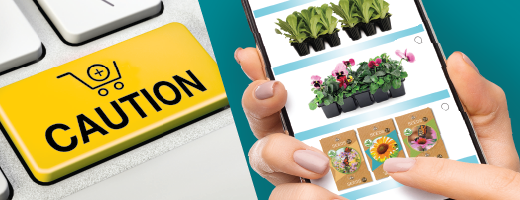Plants

Just because something is sold online doesn't mean it is approved to enter Canada or be shipped within the country.
The Canadian Food Inspection Agency (CFIA) is Canada's national plant protection organization. The CFIA is entrusted with this responsibility as part of its overall mandate to protect Canada's food, plant and animal resources.
Plant pests such as insects, fungi and snails can cause damage that is costly and extensive for Canada. The most effective way to deal with plant or plant product pests is to prevent their entry into Canada.
How can you help?
DO follow our tips when buying or selling plant products online.
DON'T assume that all products available online meet CFIA regulatory requirements.
On this page
- Plants, bulbs and seeds
- Insects and other invertebrates
- Handicrafts and other wooden products
- Regulatory requirements for plant health
- Additional information for shoppers and sellers
Plants, bulbs, seeds
Some plant species, for example, sold as specialty indoor or outdoor (garden) varieties can be invasive when introduced into Canada.
Plant parts used for propagation (such as seeds, cuttings, roots, tubers, buds stems or sticks) can carry plant pests and diseases, especially if there is soil associated with the plant material.
Seeds can also be contaminated with seeds of other species including weeds and invasive plants. Even the packaging materials for some plants, and plant parts, can introduce plant diseases and pests.
Insects and other invertebrates
Importing or shipping insects and other invertebrates (such as earthworms, snails, slugs, and fungi) including their use as pets, pet food, or specialty foods (such as crickets) could pose a risk to Canada's environment and economy.
When purchasing insects and other invertebrates in any form – be it live, dried, frozen, or processed – there is still a risk that the insect is harbouring pests, or diseases or be itself an invasive species.
Handicrafts and other wooden products
Some wooden products or crafts purchased online could cause harm to our agricultural, forestry and horticulture industries, and our economy. Items that include invasive plant seeds, dried grasses, leaves or flowers may also contain pests that are harmful to the environment since they are not native to Canada.
Regulatory requirements for plant health
The same requirements that apply to traditional types of commerce apply to online buying and trading of plants and other organisms.
Those who engage in an activity regulated by the CFIA are responsible for meeting applicable legal requirements under the Plant Protection Act and the Plant Protection Regulations.
This includes anyone who is importing, exporting or selling such products – even if they are doing it on a small scale online from their own home.
Provincial and territorial requirements may also apply.
Additional information for shoppers and sellers
Here are more dos and don’ts for:
Shoppers
Other things to consider include:
- Know who and where you are buying from. Do your research, particularly if the product or source is unfamiliar to you. Check independent reviews of the seller and their products. Don't only rely on the reviews on the company's website.
- Contact the company and ask questions if the product information is unclear.
- Be aware of Canadian import requirements. Importers who do not meet Canadian requirements may, among other things, experience delays at the border or have their shipment held at the border or removed from Canada.
- Consult the Convention on International Trade in Endangered Species of Wild Fauna and Flora (CITES) checklist for a list of endangered species that are illegal to sell anywhere.
Sellers
- Verify that your product meets all applicable requirements.
- Use the Automated Import Reference System (AIRS), which provides the latest CFIA import requirements.
- Check the import conditions for the destination country for the product you are planning to export.
- Obtain certification of the product to be exported where required.
Other things to consider include:
- Consult the Convention on International Trade in Endangered Species of Wild Fauna and Flora (CITES) checklist for a list of endangered species that are illegal to sell anywhere.
- Check that the product is coming from a trusted supplier.
- Check the airline, transport, and shipping requirements.
- Look into taxes, duties and customs.
- Maintain good customer relations – answer their questions.
More information
- Notice: Imported gift baskets containing food
- Buying, selling and trading of plants and other organisms
- Importing plants and plant products: what you need to know
- Importing and handling invertebrates and micro-organisms
- Seed imports
- Invasive plants in Canada
- Invasive Species
- Tiny seeds you buy online can cause big trouble (Inspect and Protect)
- Meet Lacy, a Canada Border Services Agency detector dog (Inspect and Protect)
- What's hiding in your furniture? (Inspect and Protect)
- Forest Invasive Alien Species (FIAS) (Natural Resources Canada)
- Alien and invasive alien species (Environment and Climate Change Canada)
- Date modified: